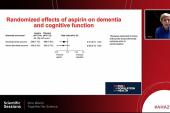Aspirin Use Ups Risk of Anemia in Elderly Patients: ASPREE
The new analysis provides yet another reason why aspirin is no longer recommended for primary prevention in healthy adults.

The use of aspirin for primary prevention has fallen out of favor following changes to clinical guidelines prompted by results from multiple trials: now, an analysis from one of those studies indicates that aspirin increases the risk of anemia in elderly patients.
In the ASPREE trial, nearly one in four older adults without cardiovascular disease developed anemia within 5 years of starting low-dose aspirin, a rate that was significantly higher than what was observed in placebo-treated participants, report investigators.
“Because aspirin is typically a long-term intervention, it is likely that anemia will become progressively more frequent as treatment continues and thus indicates the need for regular measurement of hemoglobin levels among older aspirin-treated patients,” Zoe McQuilten, MBBS, PhD (Monash University, Australia), and colleagues write in their paper, published online June 19, 2023, in the Annals of Internal Medicine. “The relative effect of aspirin on anemia was consistent across subgroups and hence the absolute effect is expected to be greater in those at increased underlying risk for anemia.”
The researchers point out that while aspirin has been widely used in older adults, that is expected to change now that there are updated guidelines for primary prevention. Numerous organizations, including the United States Preventive Services Task Force, American College of Cardiology/American Heart Association, and the European Society of Cardiology, take a firm stance with aspirin on the basis of ASPREE, as well as ASCEND and ARRIVE. Broadly speaking, the experts say aspirin should be used sparingly in those without cardiovascular disease given the risks of bleeding.
Risks of Anemia
Anemia is relatively common in older adults, according to the researchers, who note that roughly 30% of people aged 75 years and older are anemic (defined as hemoglobin < 110 and 120 g/L for women and men, respectively). While it’s more common in hospitalized patients, data suggest anemia is present in approximately 12% of older adults in the community.
“The most common causes of anemia in the elderly are iron deficiency, renal impairment, chronic disease/anemia of inflammation, and other hematinic deficiencies,” McQuilten told TCTMD in an email. “In approximately a third of cases, the cause cannot be identified—this is often referred to as unexplained anemia of the elderly. . . . We knew from other trials, and from the primary results of ASPREE, that long-term low dose aspirin causes clinically significant bleeding, for example bleeding requiring hospitalization or a blood transfusion. However, few large trials had assessed the effect of aspirin on anemia or hemoglobin and it was unclear whether aspirin contributed to anemia risk.”
Importantly, the authors note, anemia isn’t benign, and is associated with functional deficits, morbidity, and mortality. To date, aspirin’s effect on the risk of anemia isn’t well known, although aspirin can contribute to anemia through blood loss, which results in iron deficiency.
To investigate, the researchers turned to ASPREE, a trial that included 19,114 adults aged 70 years and older in Australia and United States randomized to aspirin or placebo. Hemoglobin concentrations were measured annually as part of the trial, while ferritin levels were measured at baseline and 3 years after randomization.
The incidence of anemia was 51.2 and 42.9 events per 1,000 person-years in the aspirin and placebo arms, respectively. The estimated probability of experiencing anemia within 5 years of treatment was 23.5% in the aspirin group and 20.3% in the placebo group. Overall, treatment with aspirin was associated with a 20% higher risk of anemia compared with placebo (HR 1.20; 95% CI 1.12-1.29). The risk was consistent when accounting for the incidence of cancer and after adjusting for various characteristics associated with anemia risk, including bleeding.
Hemoglobin concentrations declined over time in both the aspirin- and placebo-treated patients but declined more sharply in the active-treatment arm. In a sensitivity analysis that accounted for major bleeding, the effect of aspirin on hemoglobin’s downward trajectory and ferritin levels was unchanged.
“Censoring of clinically significant bleeding events in this analysis indicates that anemia likely related to lesser-grade or occult bleeding,” write McQuilten et al. “Nevertheless, higher incidence of clinical bleeding due to aspirin in censored patients adds support to the hypothesis that aspirin promotes bleeding in older adults—either overt or occult. Whereas only a minority of participants are likely to experience major bleeding, this study demonstrates an increased risk for anemia likely due to lesser degrees of bleeding (including occult blood loss) induced by aspirin.”
The researchers say that while aspirin use in primary prevention will decline, “its long-term use will continue among a substantial fraction of the older population for secondary prevention.”
McQuilten stressed to TCTMD that ASPREE was conducted in the primary prevention setting so can’t be extrapolated to patients with a history of heart disease, in whom low-dose aspirin is still supported by guidelines. “However, clinicians should take into consideration this risk of anemia and iron deficiency when monitoring their patients who are taking long term low dose aspirin for a proven indication,” she advised.
Michael O’Riordan is the Managing Editor for TCTMD. He completed his undergraduate degrees at Queen’s University in Kingston, ON, and…
Read Full BioSources
McQuilten ZK, Thao LTP, Pasricha SR, et al. Effect of low-dose aspirin versus placebo on incidence of anemia in the elderly: a secondary analysis of the aspirin in reducing events in the elderly trial. Ann Intern Med. 2023;Epub ahead of print.
Disclosures
- McQuilten reports no conflicts of interest.





Comments